From skits to scripts: Theo Shakes on his debut play
Dominion Road pulses with the end-of-week rush as commuters inch home and weekend plans spill onto the streets. As dusk deepens and neon lights bathe the pavement, stepping into the Auckland Theatre Company rehearsal room feels a world away from the urban chaos. Here, a quartet of young thespians—Theo Shakes, Callum Hibbert, Justice Kalolo and Finley Hughes—trade in their Friday night plans to rehearse The Play That Gets Louder.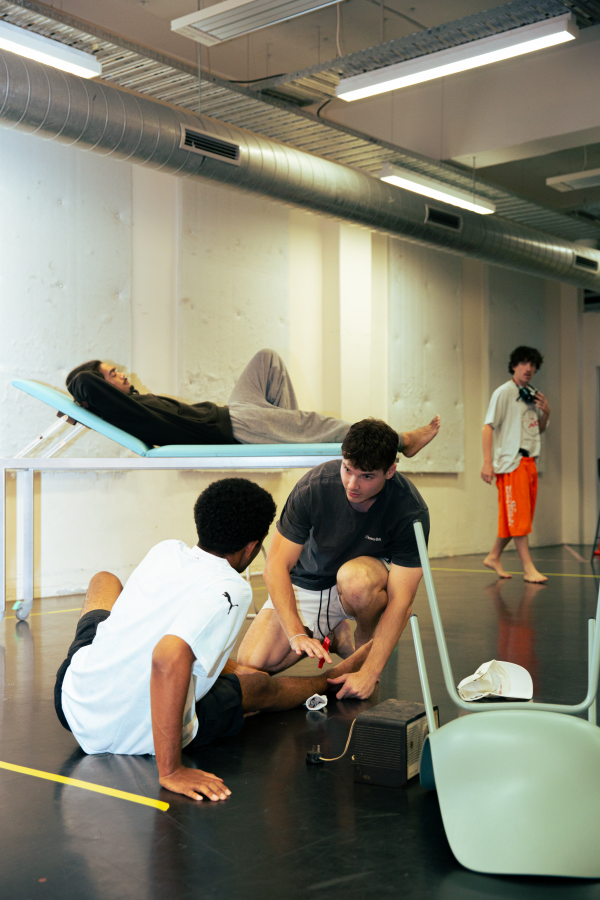
Photo, Shruthi Priya Balaji
The name behind this original stage production is a recognisable one. Theo Shakes, the 23-year-old content creator best known as “the man who’s lived every life,” has mastered the art of imitation. With almost 2 million TikTok followers, the filmmaker, actor, and content creator has likely popped up on your FYP with one of his alarmingly accurate impressions—whether it’s a cool, calm bartender mid-rush, a retail worker barely making it through their shift or any other painfully relatable trope. If it’s a character you’ve encountered in real life, chances are Shakes has already embodied them.
But now, Shakes is swapping viral skits for the stage. His latest project, The Play That Gets Louder, is an original work that harrowingly examines brotherhood, legacy, and the echoes of conflict.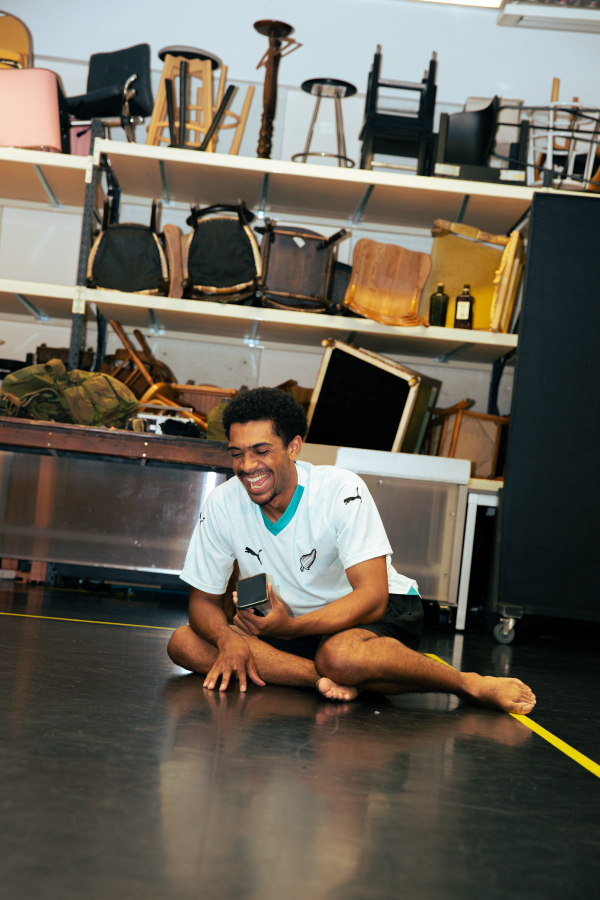
Theo Shakes in rehearsals for The Play That Gets Louder. Photo, Shruthi Priya Balaji
Co-produced by Black Creatives Aotearoa and Booth Box Banter, two companies supporting African artists in Aotearoa, the show marks a significant departure from Shakes’s digital persona into a live theatre experience. “How do I bring anyone who watches that content into the theatre?” He questions. “Because it’s not the same thing.”
While millions of people can rewind and replay his TikTok videos as they please, live theatre offers a different kind of intimacy. “Theatre is one of those things where you only get to see it once,” Shakes explains. “Our venue seats around 100 people—that’s 100 people per night for five nights. 500 people, and that’s it.” For Shakes, this transition isn’t just about the number of views—it’s about telling a story through a medium that can’t be replicated online.
Set in a crumbling hospital ward, The Play That Gets Louder, directed by Logan Coles, follows four soldiers—Cooper (Shakes), Richards (Hibbert), Bentley (Kalolo), and Vitor (Hughes)—through a blood-soaked conflict.
The men—or perhaps more fittingly, the boys—reveal buried memories and grapple with themes of identity, duty, and connection. Shakes calls his debut script a tribute to mothers,' a nod to the maternal presence that threads through each character’s past.
Shakes speaks passionately, with a gravitational pull that draws you into the world he’s created. "I wanted to write about friendship and the complex bond between males," He explains. "I'm exploring these themes through war, questioning who we would be and what we would become if we were sent to battle tomorrow.”
The genesis of The Play That Gets Louder was born in 2023 at Shakes’s Pōneke flat. “I’ll never forget when I started writing, my flatmate came home, and I’m like, ‘I think I’ve written a play,’” he recalls. What began as a spontaneous exploration of sound and storytelling soon evolved into something more ambitious. “I wanted to explore complex characters, test their differences, and figure out what brings them together—that’s where the themes of brotherhood and motherhood came in.”
With its first reading at Basement Theatre the following year, Shakes then reworked the script, opting for more ambiguous character backgrounds to allow for interpretation. "I didn’t want the characters to be too on-the-nose," he explains. "Making their origins more ambiguous let the story breathe—it became less about where they’re from and more about who they are."
“The first draft was all about looking at World War II,” Shakes explains. “Then I went further back into World War I. We took a field trip to the Auckland War Memorial Museum and stood in front of the names on the walls and in my lineage, there was a soldier named Richards. That’s why I named a character after him.”
The Play That Gets Louder isn't just a historical recount; it serves as a cautionary tale. It acts as a memorial for those who fought for the freedom of expression, especially in regimes where art was suppressed and silenced.
Shakes poses the question: “What happens when history shifts just slightly? If one small thing changed at the end of World War I, where would we be now?It’s weird how we forget how significant that history was. We think about what's happening now, but sometimes we need to look back and say ‘Look, this is what we did. We don’t want to do that again.’”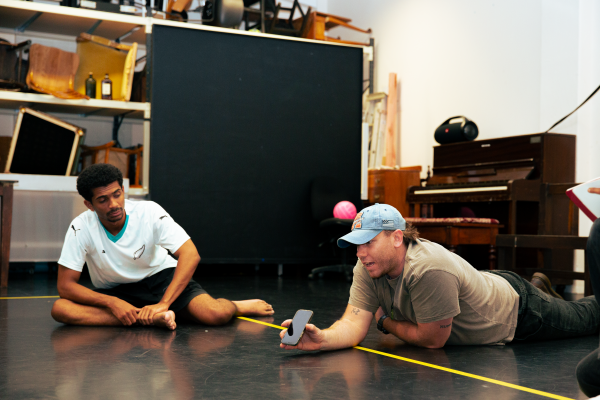
Playwright Theo Shakes (left) and Director Logan Coles (right). Photo Credit, Shruthi Priya Balaji
Miscellaneous furniture is pushed into a corner of the room like a game of Tetris made up of tables and chairs. Fluorescent yellow tape snakes across the black lino floor, marking the stage’s boundaries. Inside its perimeter: an old hospital bed, a static-filled radio, and empty liquor bottles.
Sprawled on the floor and still flushed from a physical warm-up, the actors form a loose, disordered circle—more reminiscent of a paint splatter than anything orderly.
Barefoot and dressed in athleisure, the group, all in their early twenties, look nothing like the uniformed soldiers they’re set to portray. Their outfits, from a powder-blue football jersey to neon orange shorts, feel far removed from the battlefield.
Shakes steps into the wounded shoes of Cooper, “Cooper’s not like me,” he reflects. “He’s incredibly brave—partly because of what he’s been through, partly because he’s had no choice. But it’s left him disoriented, questioning everything.” Born into a long line of soldiers, he carries the weight of legacy. “It’s like being born into the royal family, or Succession,” he says. “He’s inherited duty—but we meet him at rock bottom, facing the question: what now?”
Callum Hibbert plays Richards, a pacifist amid a war zone—a medic who refuses to bear arms, committed solely to healing. “Out of the four people in the room, he’s the objector,” Callum explains. “He doesn’t want to be here—he has to be. His job is to save lives. That’s it. Never to harm. Only to help, help, help. And that’s a really beautiful thing… that in the odds of war, he’s sticking to that."
Justice Kalolo is thoughtful and composed—a sharp contrast to the cocky, emotionally guarded character, Bentley, he portrays on stage. “He’s a cocky bastard, and I wouldn’t say I’m a cocky bastard,” he laughs. “But within the chaos of what’s going on, he finds how to show his true emotions which is rare for him.” Kalolo, who was directing his own production in Pōneke’s Fringe Festival while auditioning for this role, initially doubted whether his self-tape would stand up against in-room auditions. “I thought I wasn’t going to get the role— So I was definitely stoked when I got it.”
Finley Hughes, is constantly in motion, legs bouncing, jokes flowing, is the live wire of the group. His character, Vitor, is hyper-intelligent and an exceptional speller—traits that Hughes found intimidating to embody, given his own challenges with dyslexia. “He’s a very, very, very good speller. And I’m severely dyslexic. That was quite daunting during the audition. I was like, ‘I don’t know how to spell these words.’ And under pressure, my dyslexia just intensifies.”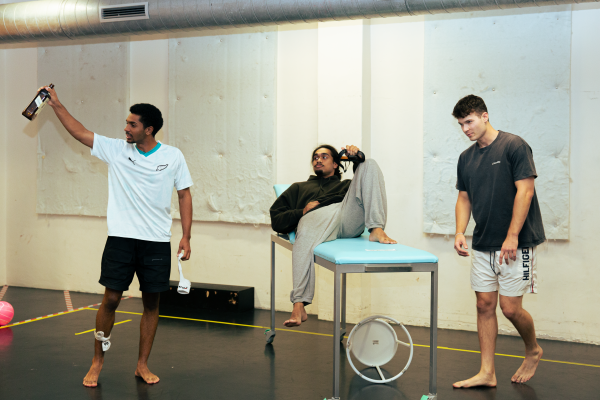
Photo, Shruthi Priya Balaji.
When asked to come up with three words to summarise the show, the boys fall short altogether. Their silence, sitting cross-legged on the floor, reminds me of schoolchildren suddenly mute when a teacher poses a question. I joke about feeling like a teacher with a classroom of unwilling children, which breaks the silence with laughter. For a room full of actors who typically have a lot to say, they’re all stumped: How do you describe a play in only three words?
Shakes: Experience. Cinematic. Brother.
Hibbert: Intricate. IMAX
Kalolo: Human. Truth. Land.
Hughes: Dirty. Love. Extreme.
Coles: Dexterous. Real. Loud.
Perhaps there’s no singular way to define The Play That Gets Louder. It’s about war, but also about friendship. It’s about history, but also about what could have been, and what might become.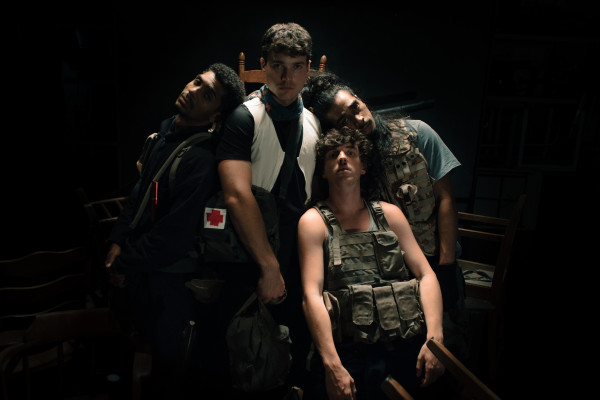
Photo, Shakie Muliro
When posed a question from his previous 2022 Remix Magazine interview, Shakes quips, “This is like one of those Billie Eilish Vanity Fair check-in interviews, huh?”
I ask Shakes if directing a feature film is still part of the goals he announced three years prior—he reveals that his focus has shifted, “I would still love to make a feature film, but through acting. I want to learn more from directors before I take that step. Unless the right story lands in my lap—because as a director, you've got to be dying to tell that story.”
It’s clear that Shakes isn’t in any rush. His creative priorities are now leaning towards projects that allow for more room to experiment.“I'm more interested in creating a series or something along those lines—shorter form pieces but more of it. A feature film takes five years for just two hours, and the process can be a lot more drawn out, whereas a series gives you more room to play with, and it could go on forever.”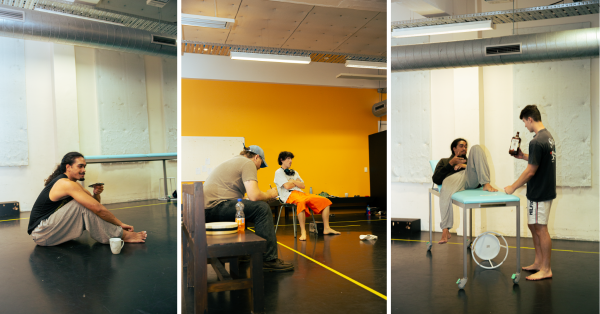
Photo, Shruthi Priya Balaji
As the interview concludes, the actors resume rehearsals and morph into their characters; into soldiers. The words within the play—“choppers, bunkers, axe, injuries, contagious”—drift through the air, unfamiliar in my day-to-day vocabulary, yet they fit seamlessly into the world Shakes has created. Coles twirls a pencil between his fingers, scribbling down annotations onto his script as he observes the actors in motion. As each character interacts, there’s a careful tension between them, a quiet alertness of each other's presence.
It’s the beginnings of a world in the making—transforming a bare stretch of studio into the decaying remains of a wartime hospital, a journey into a retrofuturistic war.
The Play That Gets Louder will be playing at the Basement Theatre from 8-12 April 2025. For tickets visit: www.basementtheatre.co.nz.



